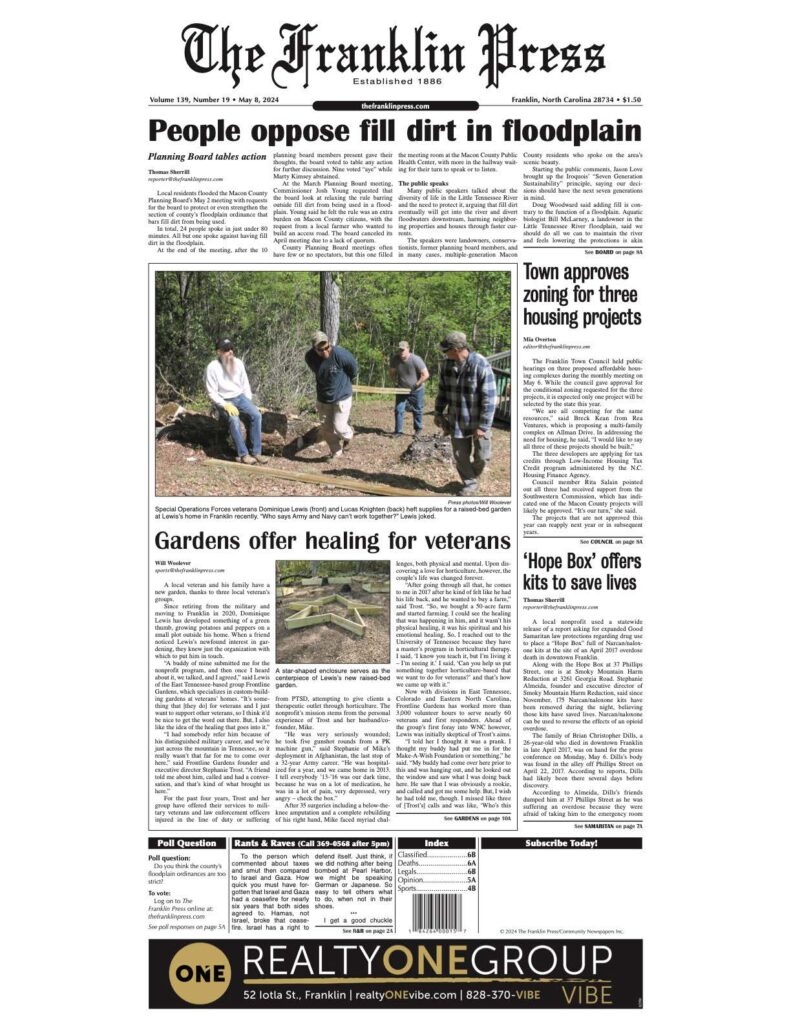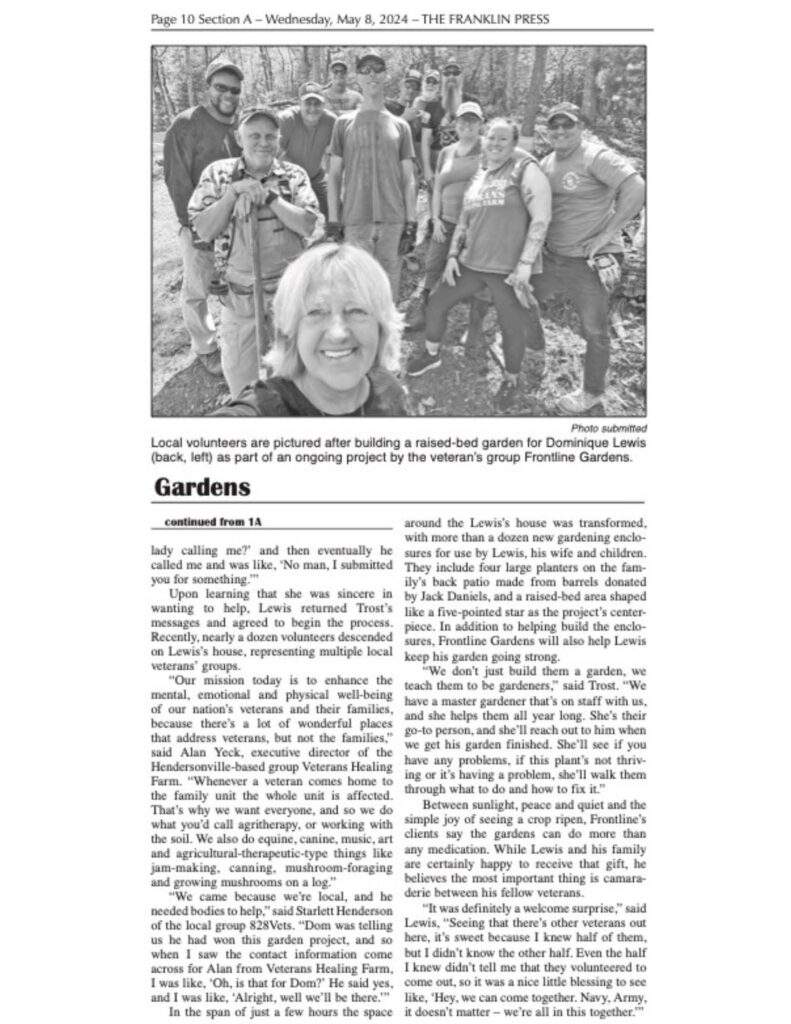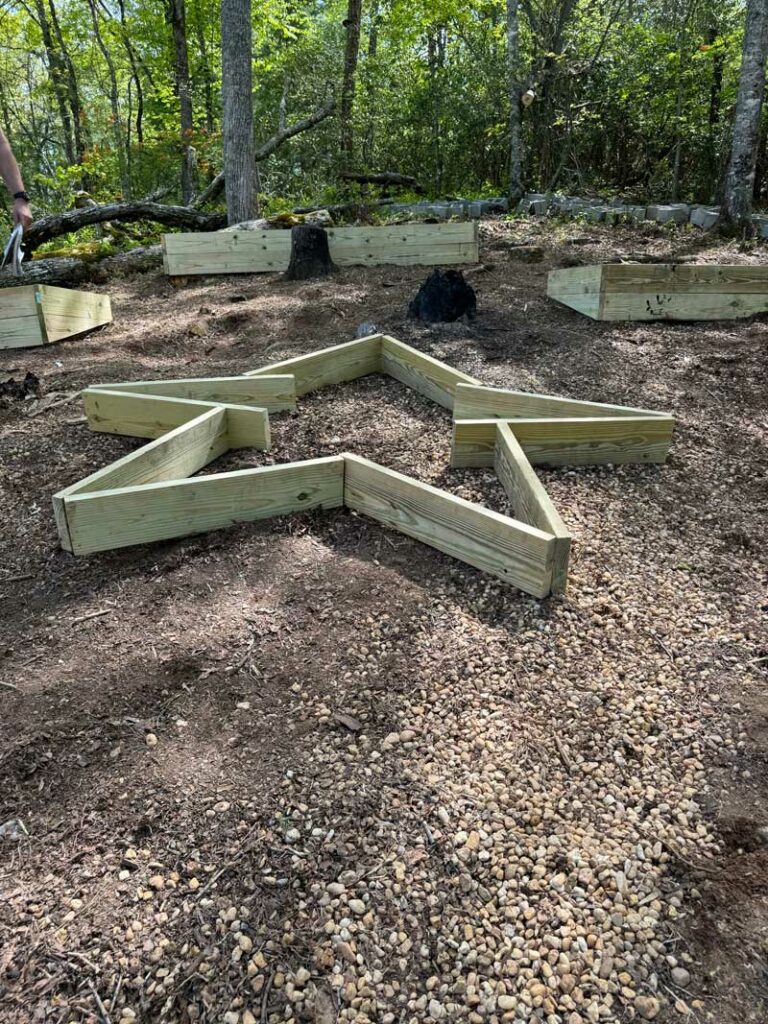By: Will Woolever


A local veteran and his family have a new garden, thanks to three local veteran’s groups.
Since retiring from the military and moving to Franklin in 2020, Dominique Lewis has developed something of a green thumb, growing potatoes and peppers on a small plot outside his home. When a friend noticed Lewis’s newfound interest in gardening, they knew just the organization with which to put him in touch.
“A buddy of mine submitted me for the nonprofit program, and then once I heard about it, we talked, and I agreed,” said Lewis of the East Tennessee-based group Frontline Gardens, which specializes in custom-building gardens at veterans’ homes. “It’s something that [they do] for veterans and I just want to support other veterans, so I think it’d be nice to get the word out there. But, I also like the idea of the healing that goes into it.”
“I had somebody refer him because of his distinguished military career, and we’re just across the mountain in Tennessee, so it really wasn’t that far for me to come over here,” said Frontline Gardens founder and executive director Stephanie Trost. “A friend told me about him, called and had a conversation, and that’s kind of what brought us here.”
For the past four years, Trost and her group have offered their services to military veterans and law enforcement officers injured in the line of duty or suffering from PTSD, attempting to give clients a therapeutic outlet through horticulture. The nonprofit’s mission stems from the personal experience of Trost and her husband/co-founder, Mike.
“He was very seriously wounded; he took five gunshot rounds from a PK machine gun,” said Stephanie of Mike’s deployment in Afghanistan, the last stop of a 32-year Army career. “He was hospitalized for a year, and we came home in 2013. I tell everybody ’13-’16 was our dark time, because he was on a lot of medication, he was in a lot of pain, very depressed, very angry – check the box.”
After 35 surgeries including a below-the-knee amputation and a complete rebuilding of his right hand, Mike faced myriad challenges, both physical and mental. Upon discovering a love for horticulture, however, the couple’s life was changed forever.
“After going through all that, he comes to me in 2017 after he kind of felt like he had his life back, and he wanted to buy a farm,” said Trost. “So, we bought a 50-acre farm and started farming. I could see the healing that was happening in him, and it wasn’t his physical healing, it was his spiritual and his emotional healing. So, I reached out to the University of Tennessee because they have a master’s program in horticultural therapy. I said, ‘I know you teach it, but I’m living it – I’m seeing it.’ I said, ‘Can you help us put something together horticulture-based that we want to do for veterans?’ and that’s how we came up with it.”
Now with divisions in East Tennessee, Colorado and Eastern North Carolina, Frontline Gardens has worked more than 3,000 volunteer hours to serve nearly 60 veterans and first responders. Ahead of the group’s first foray into WNC however, Lewis was initially skeptical of Trost’s aims.
“I told her I thought it was a prank. I thought my buddy had put me in for the Make-A-Wish Foundation or something,” he said. “My buddy had come over here prior to this and was hanging out, and he looked out the window and saw what I was doing back here. He saw that I was obviously a rookie, and called and got me some help. But, I wish he had told me, though. I missed like three of [Trost’s] calls and was like, ‘Who’s this lady calling me?’ and then eventually he called me and was like, ‘No man, I submitted you for something.’”
Upon learning that she was sincere in wanting to help, Lewis returned Trost’s messages and agreed to begin the process. Recently, nearly a dozen volunteers descended on Lewis’s house, representing multiple local veterans’ groups.
“Our mission today is to enhance the mental, emotional and physical well-being of our nation’s veterans and their families, because there’s a lot of wonderful places that address veterans, but not the families,” said Alan Yeck, executive director of the Hendersonville-based group Veterans
Healing Farm. “Whenever a veteran comes home to the family unit the whole unit is affected. That’s why we want everyone, and so we do what you’d call agritherapy, or working with the soil. We also do equine, canine, music, art and agricultural-therapeutic-type things like jam-making, canning, mushroom-foraging and growing mushrooms on a log.”
“We came because we’re local, and he needed bodies to help,” said Starlett Henderson of the local group 828Vets. “Dom was telling us he had won this garden project, and so when I saw the contact information come across for Alan from Veterans Healing Farm, I was like, ‘Oh, is that for Dom?’ He said yes, and I was like, ‘Alright, well we’ll be there.’”
In the span of just a few hours the space around the Lewis’s house was transformed, with more than a dozen new gardening enclosures for use by Lewis, his wife and children. They include four large planters on the family’s back patio made from barrels donated by Jack Daniels, and a raised-bed area shaped like a five-pointed star as the project’s centerpiece. In addition to helping build the enclosures, Frontline Gardens will also help Lewis keep his garden going strong.
“We don’t just build them a garden, we teach them to be gardeners,” said Trost. “We have a master gardener that’s on staff with us, and she helps them all year long. She’s their go-to person, and she’ll reach out to him when we get his garden finished. She’ll see if you have any problems, if this plant’s not thriving or it’s having a problem, she’ll walk them through what to do and how to fix it.”
Between sunlight, peace and quiet and the simple joy of seeing a crop ripen, Frontline’s clients say the gardens can do more than any medication. While Lewis and his family are certainly happy to receive that gift, he believes the most important thing is camaraderie between his fellow veterans.
“It was definitely a welcome surprise,” said Lewis, “Seeing that there’s other veterans out here, it’s sweet because I knew half of them, but I didn’t know the other half. Even the half I knew didn’t tell me that they volunteered to come out, so it was a nice little blessing to see like, ‘Hey, we can come together. Navy, Army, it doesn’t matter – we’re all in this together.’”

